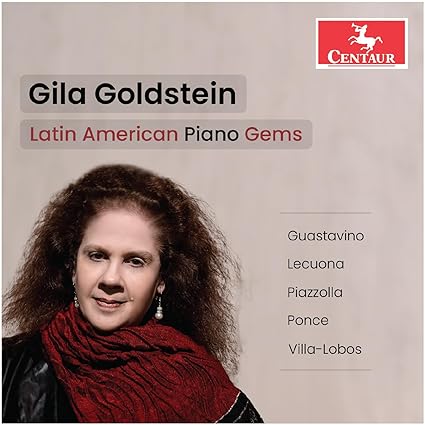

Carlos Guastavino (1912-2000): Las Niñas Heitor Villa-Lobos (1887-1959): Impressões seresteiras (No. 2 from Ciclo Brasileiro, W. 374) Ernesto Lecuona (1895-1963): Córdoba (No. 1 from Suite Andalucía) Ernesto Lecuona: La Comparsa (No. 6 from Danzas Afro-Cubanas) Ernesto Lecuona: Malagueña (No. 6 from Suite Andalucía) Carlos Guastavino: Sonatina in G minor Manuel Ponce (1882-1948): Intermezzo No. 1 Carlos Guastavino: Retama (No. 2 from Tres Sonatinas) Heitor Villa-Lobos: Alma Brasileira (Chôros No. 5), W. 207 Carlos Guastavino: Mariana (No. 4 from Las Presencias) Astor Piazzolla (1921-1992): Adiós Nonino (arr. for piano by Laércio de Freitas) Astor Piazzolla: Oblivion (arr. for piano solo by Gila Goldstein)
With its gentle rhythmic sway, tango lilt, distinctive harmonic modulations and inflections, Latin American music projects a very appealing and seductive sound. Despite the influence of its Spanish ancestry, it very much stands apart in the "classical" music idiom. I may be stepping out on a limb when I say that its generally melancholic and sentimental character often reminds me of the music from the great French chansonniers of the past like Gilbert Bécaud (C'est en Septembre) and Edith Piaf (Hymne à l'amour) to name but two. With its suspended harmonic resolutions it pulls at the heart strings and exudes a deep sense of sad reminiscence which constantly pulls you in.
Of Carlos Guastavino, the booklet notes point out his "lyricism and nostalgia in rich chromatic harmonies" along with "echoes of melancholy and nostalgia". Many of Cuban composer Ernesto Lecuona's pieces "have become standards of the classical, Latin and jazz repertoires". Of the Mexican Manuel Ponce it is said that he "loved the folk music of his native land and often incorporated that style into his classical works". And we all know that Heitor Villa-Lobos "absorbed the musical influences of Brazil's indigenous cultures, and also played with street music bands". And of Adiós Nonino by Argentinian composer Astor Piazzolla, the booklet notes state "it is a soulful piece, evoking a strong sense of longing".
But all vivid portraitures aside, it takes a sensitive and highly expressive musician to convey the heart and soul that lies behind the notes of any given piece of music. Israeli pianist Gila Goldstein certainly demonstrates a deep connection and affection for this music all through the program, with an affinity for expressive phrasing and subtle dynamic nuances that enhance its core characteristics. A fine example of this can be heard in the audio clip below of her own arrangement of Piazzolla's Oblivion, originally written for bandoneon, piano and bass.
Jean-Yves Duperron - July 2024 Astor Piazzolla - Oblivion